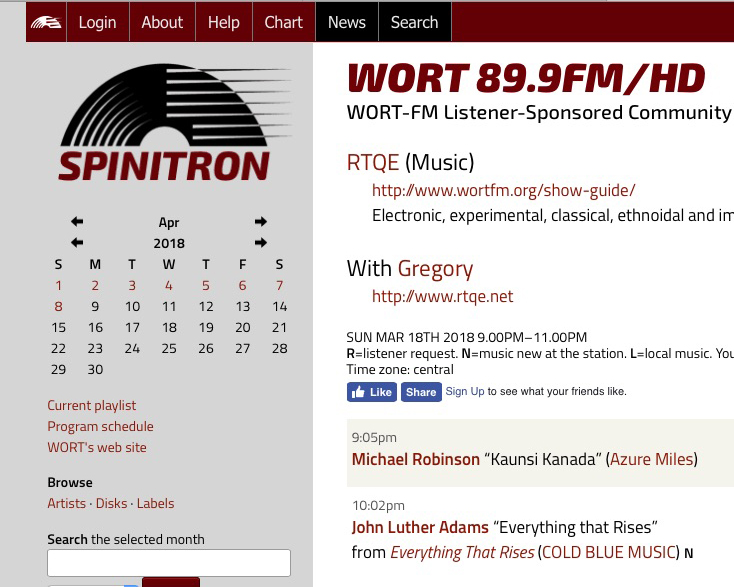Myself and Two Contemporaries

Screenshot capturing Michael Robinson and John Luther Adams sharing a radio program of extended works together.
This is to document radio connections between myself and two contemporaries, John Luther Adams and Arvo Pärt. RTQE, hosted by Gregory Taylor, airing on WORT FM in Madison Wisconsin, featured roughly hour-long compositions by myself and Adams. New, Old & Unexpected, hosted by Tim Page, airing on WNYC in Manhattan, featured a live interview with myself, and another segment featuring Pärt's music on the same show. My impression is this may have been the first time the music of Arvo Pärt was heard on Page's show if not WNYC altogether. Michael Robinson being interviewed by Tim Page. Arvo Pärt is mentioned in the opening moments for a later segment of the same show.
Kaunsi Kanada, played by Taylor, is one of many compositions ranging in duration from forty minutes to three-and-a-half-hours based upon personal interpretations of raga form, the most recent being Lotus-Pollen. My feeling is these works represent a present-day metamorphosis of Western symphonic form. I have a deep love for Western classical music, and that influence is central to my composing. One essential element of this reverence is how that tradition, to be real, must represent an original evolution as opposed to repeating the past. This was the central issue facing me when I decided to focus my musical energies on composition in 1979. I was dissatisfied with the Western composition of my time, and endeavored to forge a pathway meeting my personal standards for originality and substance. ("Quality is epiphany illuminated by a jewel of the lotus.") Inner validation is really all we have. Relying upon the opinions of others is secondary, though certainly welcome when in the form of positive encouragement and enjoyment. Kaunsi Kanada has also been heard in its entirety on Discreet Music on KPFA FM in Berkeley, California, and Transfigured Night on WKCR FM in NYC.
Thursday Evening is one of Michael Robinson's early Meruvina works featured on New, Old & Unexpected.
Trembling Flowers is another early Michael Robinson composition for Meruvina featured on New, Old & Unexpected together with Pony and Velvet Air.
Both Adams and Pärt are more widely known than myself, perhaps partly because what they do is much closer to music of the past, while my music sometimes confounds listeners due to an original melding of jazz, Indian classical and Western classical elements together with the rock and various forms of popular music I grew up with, the latter being so centrally absorbed as to be nearly invisible, so to speak. Gregory Taylor, who continues to play my recordings on his most important show, featured myself in his first and only column for the regretfully short-lived creativesynth (dot) com publication, advocating my music for achieving an original and formidable assimilation of Indian classical music influences, and also for moving beyond conventions of computer and electronic music. (There is a tendency for his radio show to avoid my more dynamic works, focusing on the Alap or Adagio aspects of my oeuvre, the second half of Kaunsi Kanada being a welcome exception.) Indeed, part of being a composer of our time is having an inner compass that selects what music traditions are most relevant, and using those to feed and build an original music upon. American jazz (the time span roughly from early Charlie Parker to late John Coltrane) and Indian classical music are the towering classical music traditions of our time, both centered upon improvisation. One apparent innovation of mine is creating notated compositions capturing a related improvisational spirit. (A number of people have found it unbelievable that my music is notated, but the evidence is there.) More so, I felt the aesthetic need to move beyond conventional performance practices, both acoustic and computer-electronic, to the medium of Meruvina. (There are three new albums of my piano improvisations not yet released representing a dramatic personal evolution.) It does continue to puzzle me why there is the impression that Steve Reich (who mentored me), Terry Riley, La Monte Young, and Philip Glass are seemingly presented as the last significant composers of Western classical music. I beg to differ, attributing such stasis to a pervasive, lingering conservatism and timidity towards change and innovation. Another mentor, Leonard Altman, also a primary influence in the life of Tim Page, advised me not to worry about how my music is received, and I do my best not to stress over this, including my admittedly clumsy attempts at self-promotion, something I do not enjoy. Efforts finding someone to help spread word of my music have not been fruitful so far, leaving this most awkward task to myself. Perhaps due to my absolute inability to compromise when it comes to music, I sometimes inadvertently alienate people and institutions, but that is something that cannot be helped because I must be true to my music. That said; I am extremely grateful for those who recognize my creative spirit as a positive, including musicians like Pandit Jasraj and Lee Konitz. - Michael Robinson, December 2020, Los Angeles
© 2020 Michael Robinson All rights reserved
Michael Robinson is a Los Angeles-based composer and writer (musicologist).
|